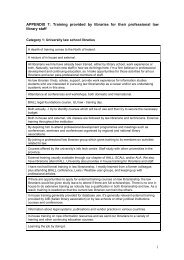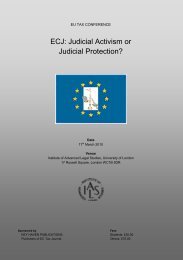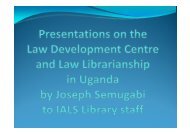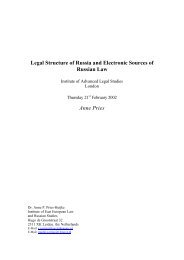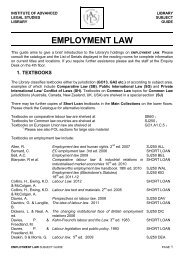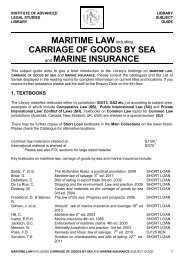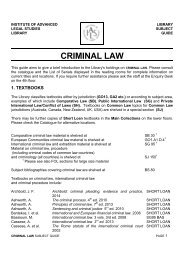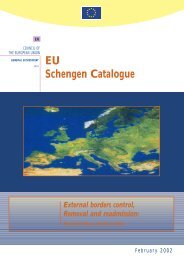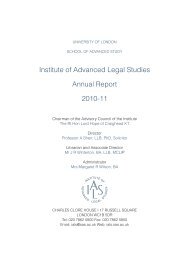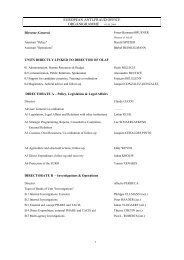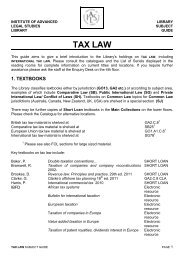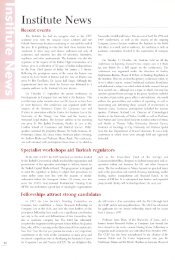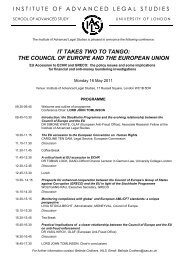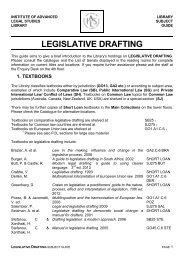a thesis - Institute of Advanced Legal Studies
a thesis - Institute of Advanced Legal Studies
a thesis - Institute of Advanced Legal Studies
Create successful ePaper yourself
Turn your PDF publications into a flip-book with our unique Google optimized e-Paper software.
62 EXPRESS TRUSTS.<br />
Mr. Lewin says: " It may be laid down as a clear and undis-<br />
«/ */<br />
puted rule that no one is compellable to undertake a trust."<br />
(Trusts, 10th ed. 209.) It follows that any person appointed a<br />
trustee has a right to disclaim the <strong>of</strong>fice.<br />
A disclaimer should be made by deed, for a deed is clear<br />
evidence and admits <strong>of</strong> no ambiguity ; but a deed is not necessary,<br />
and a verbal disclaimer has been held sufficient (Foster v. Daicber<br />
(1860), 8 W. E. 646), as has also a disclaimer by mere conduct.<br />
(Stacey v. Elph (1833), 1 M. & K 195; In re Gordon (1877),<br />
L. E. 6 Oh. App. 531; In re BirchaU (1889), 40 Ch. D. 436.)<br />
And since the trustee cannot disclaim the <strong>of</strong>fice without also disclaiming<br />
the legal estate in the trust property, if his conduct shows<br />
that he has disclaimed the trusteeship, it also shows that the legal<br />
estate is not in him. (In re Birchall, supra.}<br />
The disclaimer must be <strong>of</strong> the whole trust; a disclaimer <strong>of</strong> part<br />
only is invalid. It is not competent for any trustee to say : " I will<br />
attend to some <strong>of</strong> the trusts, and I will not attend to others." So<br />
that even though part <strong>of</strong> the trust property be in England and<br />
part in a foreign country, and the trustee be resident in the foreign<br />
country, if he accepts the trusts as to the foreign property he<br />
accepts them wholly, or, putting it conversely, if he executes a disclaimer<br />
<strong>of</strong> the trusteeship so far as it relates to the English property<br />
only, it does not operate as a disclaimer at all. (In re Lord<br />
and Ful/erton's Contract, (1896) 1 Ch. 228.)<br />
A disclaimer ought to be made without delay. If the trustee<br />
allows more than a reasonable length <strong>of</strong> time to elapse a presumption<br />
arises that he has accepted. It is then a question <strong>of</strong> fact<br />
whether his acquiescence amounts to an acceptance <strong>of</strong> the <strong>of</strong>fice.<br />
(Lewin, 210, 214.) And the disclaimer must be made before the<br />
trustee has entered on the duties <strong>of</strong> the <strong>of</strong>fice, for a trustee who has<br />
once accepted the trust cannot afterwards renounce it. (Snell,<br />
Equity, 12th ed. 151; Underbill, Trusts and Trustees, 6th<br />
ed. 148.)<br />
Sect. 7 <strong>of</strong> the Eeal Property Act, 1845, provides that an estate<br />
or interest in any tenements or hereditaments in England <strong>of</strong> any<br />
tenure may be disclaimed by a married woman by deed; and that<br />
every such disclaimer shall be made conformably to the provisions<br />
<strong>of</strong> the Fines and Eecoveries Act, 1833. Having regard to the<br />
decision in In re Harkness and Attsopp's Contract (1896, 2 Ch.<br />
358), the Married Women's Property Act, 1882, does not seem to



